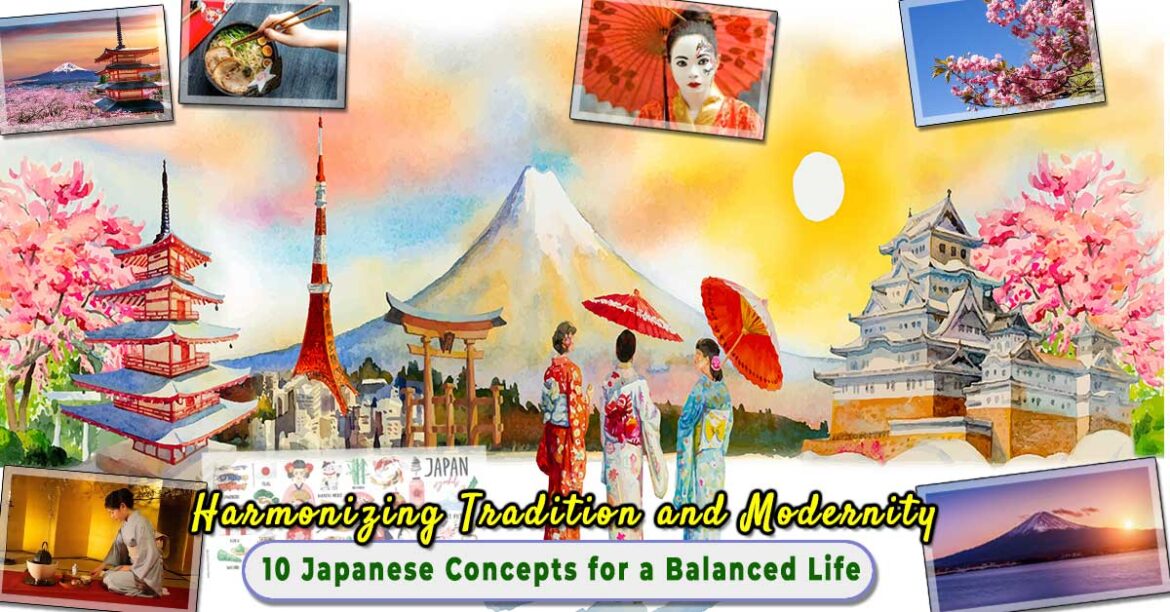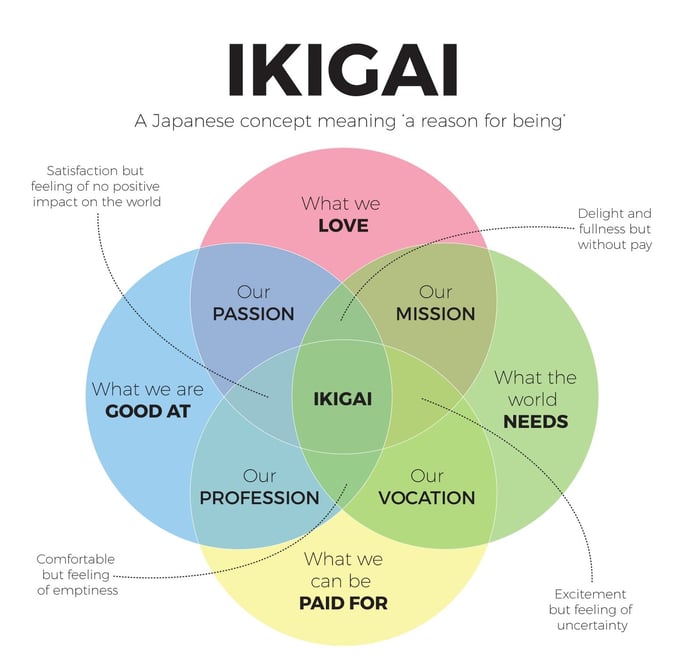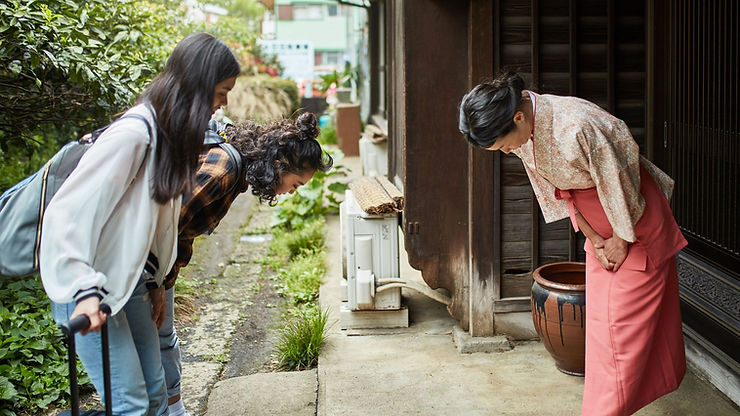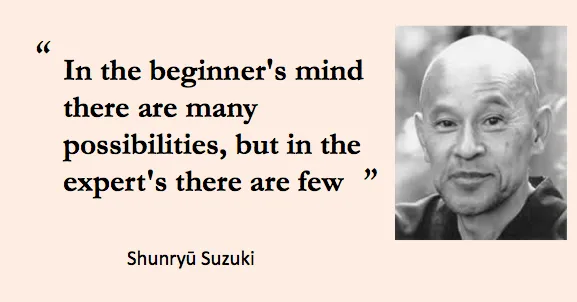Japanese lifestyle, a captivating blend of tradition and modernity. Japan offers a profound glimpse into a way of life that has captivated the world. The essence of the “Japanese Way of Life” lies in its extraordinary ability. Harmonizing age-old customs with the ceaseless wave of contemporary innovation.
In this in-depth exploration of the Japanese culture and traditions. We’ll delve into 10 Japanese concepts of life. It reveals the secrets of harmonizing Japanese traditions and modern culture. The insights into “land of rising sun” are deeply ingrained in Culture of Japan. And provide a roadmap for self-improvement and achieving balance in an ever-changing world.
To understand Japanese customs, we must embrace Ikigai meaning. Wabi-Sabi meaning values imperfection and impermanence in aesthetics. Kaizen 5S organizes workplaces efficiently. We can learn daily from Life in Japan. Well… Each Japanese principles offers a unique perspective on living a more meaningful life. Join us as we embark on a harmonious journey to unravel the wisdom of everyday Japanese way of life.
Also Read :
- Top Agritech Startups Fueling Agriculture Growth in India
- Nature as Medicine: Rediscovering the World’s Oldest Prescription
- Boost Fitness with Japan’s 3-Minute Interval Walking Routine
Unveiling Life-Transforming Wisdom from Japanese Culture
As a Mass Communication Specialist and Business Coach, I have done immersive research on Japanese concepts. The studies have uncovered a treasure trove of insights. These Japanese concepts of life transcend borders and disciplines. From the profound “Ikigai meaning” to the Zen art of mindfulness.

These things to know about Japanese culture and traditions are lessons that hold the power to enrich our personal and professional lives. Insightful learnings from life in Japan, help manage and thrive in the intricate dance of work and life.
Join me as we take a closer look at the captivating world of Traditional Japanese culture and traditions. Let’s discover the life in Japan and the transformative wisdom it offers to all who seek it. The harmonious blend of tradition and innovation, respect, and resilience. Japanese Culture Facts provides a timeless roadmap for growth and balance.
Japan: The Land of Rising Sun
Nestled in the heart of East Asia, Japan boasts a rich cultural heritage that spans millennia. Japan is often called “The Land of Rising Sun.” From the graceful art of tea ceremonies to the intricate beauty of kimono design. Japanese Lifestyle as we know has a rich history, stunning landscapes, and cutting-edge technology.

It’s a place where ancient traditions harmonize with modernity. The country’s traditions have left an indelible mark. Cherry blossoms, sushi, and samurai are just a glimpse of its cultural allure. Omoiyari, the Japanese practice fosters understanding and fosters a culture of empathy and kindness towards others.
In Japanese belief, a bell’s sound symbolizes good luck and dispels misfortunes, contributing to a positive and auspicious atmosphere. Bells and wind chimes, imbued with religious meanings, create delightful sounds. Metal and glass varieties, like summer furin in Japan, adorn souvenir shops.
Japanese Longevity Secrets
Japanese Lifestyle boasts the world’s highest life expectancy, averaging around 83 years. This remarkable feat is attributed to a trifecta of factors. A balanced diet is rich in seafood and vegetables. A tight-knit community that fosters social well-being. And an efficient healthcare system that ensures accessible and quality medical care.

Embracing Tradition in a Modern World
Life in Japan, tradition is not a mere relic of the past. It is a dynamic force that weaves its way through every facet of life. One cannot overstate the significance of tradition in Japanese culture. It’s deeply rooted in the nation’s identity. Japanese concepts serve as a continuous thread connecting past, present, and future.
These age-old Japanese customs offer a sense of belonging and shared heritage. The Japanese way of life act as a compass. It guides individuals on their journey through the complexities of modern culture.

Japanese Culture : Life Lessons
Our profound study of Japanese culture unveils invaluable insights . One who reads can seamlessly integrate into his daily lives. Whether it’s fresh start mindset, dedication, respect, or family values, these offer a blueprint . Viewing Japanese culture as a gift, we can draw inspiration. Embrace these Japanese concepts for personal growth principles to enrich your journey.
Japanese concepts “Gaman” (我慢) Translates to Perseverance in English. holds profound significance within the realm of business ethics. It offers invaluable lessons that can be applied to various professional situations. This technique in Japanese traditions teaches us the art of enduring challenges with patience, dignity, and resilience. Thus providing a resilient framework. Helping us to navigate obstacles and maintaining motivation in the corporate world.
Japan: A World of Fascinating Quirks
Japan, a nation of captivating contradictions, boasts a plethora of unique quirks that are nothing short of fascinating. Here are ten fun facts that offer a delightful glimpse
- Cherry blossoms, or “sakura,” hold an annual nationwide fascination, inspiring festivals, and hanami (flower-viewing) gatherings.
- Japan is home to over 6,800 islands, with Honshu, Hokkaido, Kyushu, and Shikoku being the largest.
- The country boasts a staggering number of vending machines. You can find vending machines on nearly every street corner. Selling everything from hot and cold beverages to snacks, electronics, and clothing.
- In Japan customs, slurp your noodles, indicating appreciation for the meal.
- Japan has the most Michelin-starred restaurants. Tokyo alone has over 200-starred restaurants. The food culture in Japan is unparalleled.
- Rabbit Island: Island in Japan populated by thousand of friendly, free-roaming rabbits.
- Manga comics and anime are hugely popular in Japan. Many popular animated shows and films originate in Japan.
- The world’s oldest company, Nishiyama Onsen Keiunkan, has been running for over 1,300 years in Japan.
- Japan is the birthplace of emoji, revolutionizing digital communication.
- The Japanese have a word for “death from overwork” called “karoshi,” highlighting their strong work ethic and dedication to their jobs.
Wabi-Sabi Meaning – Embracing Imperfection and Transience
A Japanese way of life centered on discovering beauty in life’s imperfections and gracefully embracing the natural cycle of growth and decay. Wabi sabi meaning an aesthetic or worldview that finds beauty in imperfection, impermanence, and simplicity. This concept teaches us to embrace flawed and imperfect things rather than seeing them as ugly or undesirable. The Japanese concepts is occasionally characterized as an appreciation for the beauty found in the “imperfect, impermanent, and incomplete” aspects of nature

Wabi-sabi encourages us to accept imperfections embrace the natural course of life. The components, wabi and sabi, have a clear distinct roles:
- Wabi finds beauty in humble simplicity, urging detachment from materialism for spiritual richness.
- Sabi observes the elegance in the aging and decay of all things, revealing hidden beauty.
This Japanese way of life is further encapsulated in “Uketamo,” – “I embrace everything life throws at me with an open heart. It signifies humble acceptance from the core. Uketamo intertwined with wabi and sabi, leads to a life approach that values acceptance, mindfulness, and an appreciation for life’s stages.
There’s a crack in everything; that’s how the light gets in.
Leonard Cohen
According to wabi-sabi, nothing lasts forever, and we should appreciate beauty even when it is fleeting. Wabi-sabi finds its essence closely linked to the Japanese tea ceremony. This ritual is a way of life in Japan, exemplifies the mindfulness and humility required to grasp the essence of this way of life fully.
Examples of Wabi-Sabi
Wabi-Sabi meaning extends beyond material things and can encompass experiences or emotions. Like crashing waves on rocks, old friends reuniting, or even an abandoned bird’s nest.
- Dried flowers or branches
- Cracked or chipped pottery
- Aged or weathered wood
- Wrinkled linen napkins
- Unique art pieces
- Belongings reflecting individual personality
- Dappled light on a bed

Five Life-Enhancing Lessons from Wabi-Sabi
Release your attachment to material possessions, learn Japanese culture for the goods in your life.
- Embrace imperfection as a natural part of life.
- Discover beauty in the simplest of things.
- Cherish your time, recognizing life’s impermanence.
- Cultivate happiness for both yourself and others.
- Genuine success starts with self-respect and a strong desire to thrive.
Wabi-sabi meaning reminds us that there is a loveliness to be found in the most mundane and ephemeral of things if we open our eyes to it. By accepting imperfection and transience, we can experience more peace and contentment in life.

Embrace Wabi-Sabi in Your Daily Life
- Appreciate Imperfections: Find beauty in the flaws, like weathered objects or aged books.
- Simplify Your Space: Declutter and let a sense of calm wash over your surroundings.
- Slow Down and Savor: Take time to enjoy simple pleasures, like a cup of tea or a walk in nature.
“Ikigai Meaning” – Finding Purpose and Passion
The Japanese concepts of “ikigai” refers to finding your purpose or passion in life, the thing that motivates you to get up in the morning. Ikigai (生き甲斐) is the reason for being on this earth our very existence.

Ikegai Meaning
Japanese term “Ikigai” has two elements. Iki, which means “life” or “alive,” and Gai, which means “value” or “worth.” Ikigai can be understood as the value or worth of life.
The two most important days in your life are the day you are born and the day you find out why
Mark Twain
Ikegai one of the core Japanese concepts represents the essence of what makes life meaningful and fulfilling. Often found at the intersection of personal passion, mission, vocation, and profession. When you discover your ikigai, you feel a sense of fulfillment and vitality.
4 Elements of Ikegai
- Passion: This aspect pertains to what you love and what brings you joy and satisfaction. It’s the things that make your heart sing and ignite your enthusiasm.
- Mission: Your mission is linked to what the world needs. It involves contributing to something greater than yourself, which can be both fulfilling and purposeful.
- Vocation: Vocation refers to what you are good at. It’s about recognizing your talents and skills, as well as your capacity to excel in a particular area.
- Profession: This aspect involves what you can be paid for. It’s the avenue through which you can earn a living and sustain your life comfortably.
When these four elements align in your life, you find your Ikigai – the true source of satisfaction, fulfillment, and purpose.
Discovering & Finding Your Ikigai- 4 Questions to Ponder
4 Equations of Life would help you find your Ikegai.
- Do what you love: Consider elements such as your personality traits, individual qualities, aspirations, and values.
- Do what you are good at: know your strengths and skills?
- Do something the world needs: What and who inspires you?
- Do something you can be paid for
The enduring traditional Japanese way of life embodied by Ikigai has valuable insights to enrich our modern culture, as it signifies the reason for living.
Start by exploring the things you are good at, things you’re passionate about, things the world needs, and things you can get paid for. This sweet spot, where all these elements converge, is where you’ll uncover your true purpose and experience a fulfilling life.
Your ikigai may not be a single thing but rather a combination of a few compatible pursuits. The key is to follow your interests and talents while also contributing value to others.
Once you discover your ikigai, make it a practice to nurture it through continual learning and action. Let it motivate you to get out of bed each day, feeling a sense of purpose and direction. Your ikigai gives life deep meaning.

Embrace Ikegai in Your Daily Life
Live each day by nurturing your passions, honing your skills, serving others, and seeking meaningful work. In this balance, you’ll discover the joy and purpose of Ikigai.
“Kaizen 5s” – The Continuous Pursuit of Improvement
Kaizen (改善) is the philosophy of continuous improvement. It is a Japanese term that combines “Kai” (meaning “change”) and “Zen” (meaning “good”). Kaizen 5s signifies “Change for the Better” or “Good Change.”
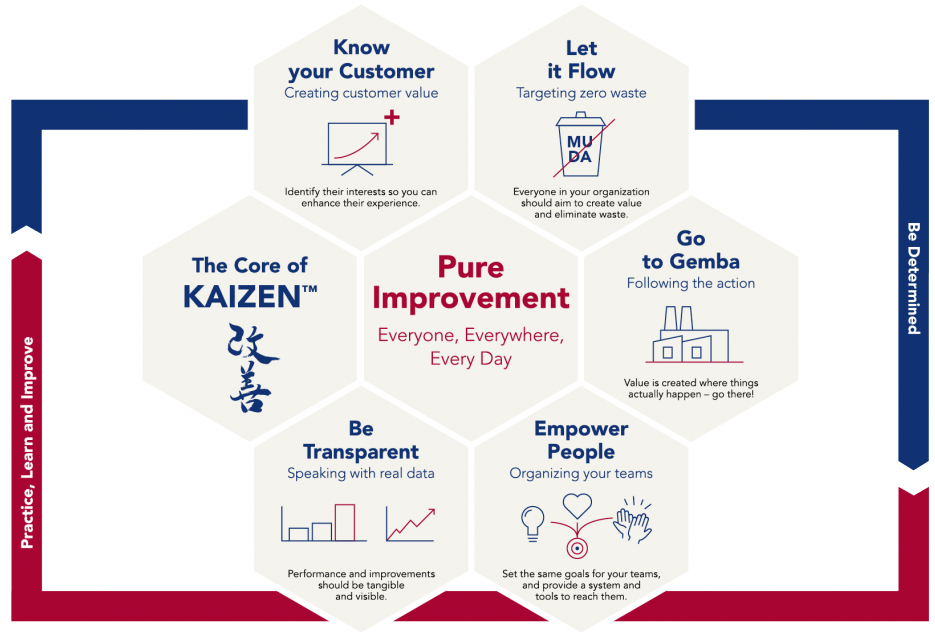
It focuses on constant innovation and progress in small increments. Rather than drastic changes, Kaizen cultivates the mindset of steady advancement through small steps.
What is Kaizen 5s
The “Five S’s” in Kaizen are Seiri (Sort), Seiton (Set in order), Seiso (Shine), Seiketsu (Standardize), and Shitsuke (Sustain). These principles collectively promote a clean, organized, and efficient workplace, which is crucial for continuous improvement.
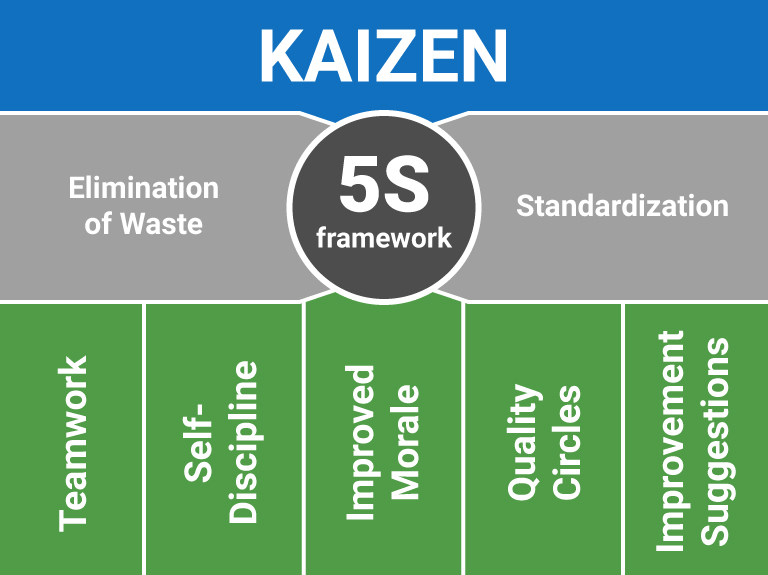
Is Kaizen Lean or Six Sigma?
When comparing Kaizen to Lean Six Sigma, a key distinction lies in their focus. Kaizen emphasizes management and employee awareness. Aiming for holistic improvement across the organization. In contrast, Lean Six Sigma places a stronger emphasis on the financial outcomes of the company. Kaizen thrives when the entire organization collaborates effectively.

The Five Founding Elements of Kaizen
The five key elements of Kaizen, a Japanese philosophy, are:

- Teamwork: Involving all levels of an organization in the improvement process.
- Personal Discipline: Encouraging individual responsibility for maintaining high standards.
- Improved Morale: Fostering a culture of positivity and empowerment among employees.
- Quality Circles: Small groups working together to identify and address issues.
- Suggestions for Improvement: Actively seeking and implementing suggestions from employees to enhance processes and productivity.
Embrace Kaizen in Your Daily Life
Simple things to learn from daily Japanese life.
- In business, Kaizen involves making minor improvements to production processes over time by reducing waste and inefficiency. Kaizen’s foundation consists of three pillars: housekeeping, waste reduction, and standardization. Organizations have the flexibility to embrace different forms of Kaizen events, with notable types such as Point Kaizen, System Kaizen, Line Kaizen, Plane Kaizen, and Cube Kaizen. These principles revolve around the central tenet.
- For individuals, it’s about developing good habits and skills through gradual progress. Don’t aim to overhaul your life overnight. Instead, pick one small habit or area of life to improve each week. Over time, these small changes will compound into lasting growth. Japanese principles to lead a good life will help you.

Examples of Kaizen in Daily Life
- Toyota applies Kaizen principles to continuously improve manufacturing processes, leading to greater efficiency and innovation.
- Amazon integrates Kaizen into its operations, emphasizing incremental enhancements in logistics and customer service for ongoing growth.
“Kintsugi” and the Beauty of Resilience
Kintsugi (金継ぎ) is the Japanese art of repairing broken pottery by mending cracks with lacquer mixed with powdered gold, silver, or platinum. Rather than disguising the damage, kintsugi highlights and celebrates it. One of the core Japanese concepts, it embraces imperfections and sees beauty in the flawed or imperfect.
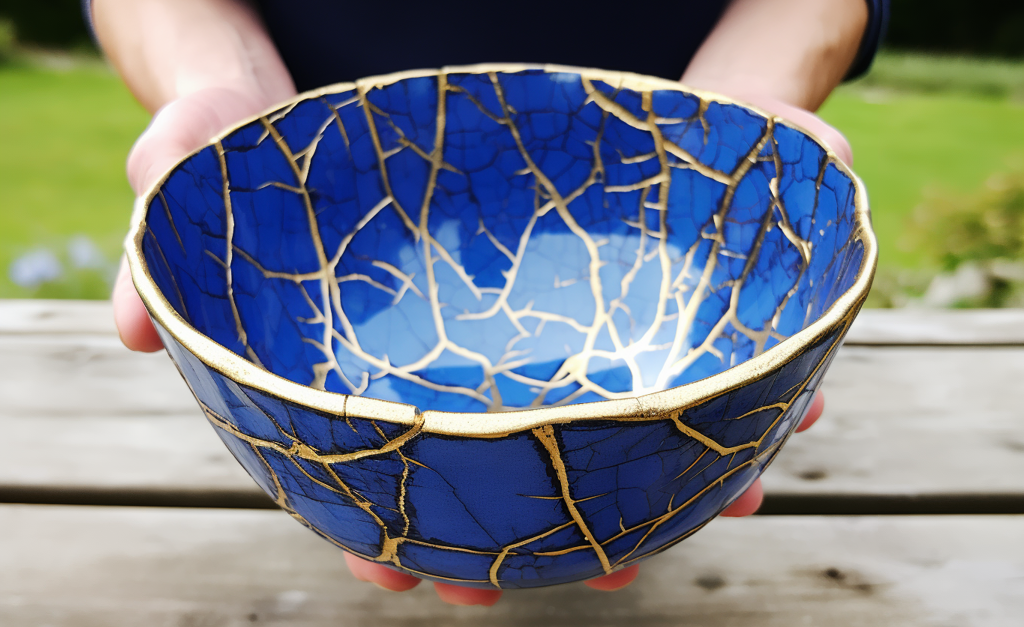
What does kintsugi teach us in life?
Kintsugi teaches that embracing our imperfections and scars can lead to greater beauty and resilience. Life is imperfect and inevitably brings hardships, failures, and breakages of many kinds. But we can choose to perceive these imperfections with compassion. We can choose to incorporate them into our story, allowing our cracks and flaws to make us stronger and more beautiful. Our hard-won scars and life experiences shape who we are.
Kintsugi: Golden Lessons in Life
- In Love: Bonding Stronger Through Life’s Scars, a testament to growth and resilience
- Marriage: Strength in mending.
- Psychology: Healing through resilience.
Apply this concept to your own life. Healing cannot happen without mentioning music. Learn to love and accept yourself, flaws and all. Your flaws and mistakes do not detract from your worth – they add character. Do not be too self-critical when you fail or fall short of expectations. Be gentle with yourself and focus on growth rather than perfection. See your life’s breaks and repairs as what makes you uniquely you.
Embrace Kintsugi in Your Daily Life
- Celebrate Resilience: Embrace setbacks as opportunities for growth.
- Mend with Purpose: Repair broken objects with golden seams, seeing beauty in their history.
- Cherish Your Scars: Honor your own journey’s imperfections and triumphs.
The “KonMari” Method: Decluttering for Mental Clarity
The “KonMari” method encourages decluttering your space for a clear mind. Created by organizational expert Marie Kondo.
Keep only those things that speak to your heart. Then, take the plunge and discard all the rest.
Marie Kondo
Declutter your Home and Spark Joy: The KonMari Method
This approach focuses on keeping only those things that “spark joy” in your life. Go through each area of your home and honestly ask yourself whether or not each item sparks joy for you. If not, thank it for its service and discard or donate it. Start with clothing, then books, papers, miscellaneous, and lastly sentimental items. By the time you finish, you’ll have a home filled only with things you love.
5 steps of the KonMari Method
The KonMari Method comprises five steps
- Commitment: Dedicate yourself to tidying.
- Category by Category: Tidy by category, not location.
- Joy Check: Only keep items that spark joy.
- Discard First: Discard before organizing.
- Find a Place: Assign a designated spot for each item.
Following the KonMari method, you can transform your living space into a place of peace and calm. A clutter-free environment reduces stress and allows you to focus on what really matters to you each day.
Shinrin-Yoku – The Healing Power of Forest Bathing
The Japanese traditions have long recognized the therapeutic effects of spending time in nature. In 1982, the Japanese Ministry of Agriculture, Forestry, and Fisheries coined the term “Shinrin-yoku,” which means immersing oneself in the forest’s atmosphere and connecting with nature.
What is Shinrin-yoku?
The Japanese concepts, Shinrin (forest) + yoku (bathing) or “forest bathing,” is the practice of immersing yourself in natural surroundings, using all your senses. Even just 15-30 minutes of walking in the woods can do wonders for your health and well-being.
Shinrin-yoku: Benefits
Studies show forest bathing lowers stress hormone levels, blood pressure, and heart rate. The fresh air and natural aromas have been shown to boost immunity and mood. Spending time in green spaces can increase energy levels and life satisfaction.
How to Practice Shinrin yoku in Daily Life?
Incorporate Shinrin-yoku into daily life by spending time in natural settings, even if briefly. Prioritize moments of mindfulness. If you’re feeling stressed or cooped up, head outside for a shinrin-yoku session.
- Find a natural area, leave your phone behind, and stroll at a leisurely pace.
- Notice the little details – sunlight filtering through the trees, the sounds of birds chirping, the springy moss under your feet.
- Breathe in the natural scents of grass and earth.
- Let the peace and stillness soak in.
Your body and mind will thank you.
“Omotenashi” – The Art of Hospitality
The Japanese concepts of Omotenashi (おもてなし) translates to hspotality life in Japan. The Japanese way of life embodies the spirit of hospitality, service, and politeness. It reflects the desire to anticipate the needs of your guests and make them feel welcome. Omotenashi is a revered service philosophy deeply rooted in Japanese culture, where pride in delivering outstanding customer and guest services is paramount.

The Three Core Principles of Omotenashi
The three core principles of Omotenashi define the deeply ingrained Japanese culture and traditions.
- Anticipation: Proactive understanding and meeting guests’ needs with precision.
- Selflessness: Putting guests’ welfare above all, with no ulterior motives.
- Sincerity: Delivering service with authenticity, respect, and genuine warmth.
Japanese Hospitality with Extra Care
In Japanese traditions, Omotenashi is expressed in all areas of customer service – from greetings by staff in stores and restaurants to the meticulous presentation of goods. Every interaction is aimed at creating a positive experience and fostering a sense of goodwill. The ultimate goal is for guests to feel personally attended to and valued.
For individuals, omotenashi is a mindset that can enrich your relationships and daily life. Expressing care for friends and family, being considerate of others’ needs, and paying close attention to the details that make people feel special are all ways to practice Omotenashi.
Adopting an attitude of selfless hospitality and service is a simple yet profound way to find more meaning, connection, and harmony in life.
What is an example of Omotenashi?
- At a traditional Japanese tea ceremony, the host practices Omotenashi by serving tea with great attention, ensuring the guest’s comfort and enjoyment throughout.
- In Japanese customs, such as in ryokans, innkeepers display Omotenashi by preparing guests’ rooms with meticulous care and serving seasonal, locally sourced meals.
- Lexus, the luxury automobile brand, incorporates Omotenashi in its customer service by offering personalized attention and thoughtful amenities, creating a seamless and enjoyable car-buying experience.

“Mono No Aware” – Appreciating the Transient
Mono No Aware (物の哀れ) signifies “The impermanence of things. In Japanese culture, the term ‘Mono’ signifies ‘thing’ or ‘objects,’ while ‘aware’ encapsulates ’emotions’ and ‘sentiments.’ In simple translation ans “The Origin of Things.”
The Japanese concepts “mono no aware” expresses the bittersweet feeling of seeing the fleeting beauty in things. It’s about finding meaning in the temporary and impermanent.
The concept of “mono no aware” (物の哀れ) originated from the literary scholar Motoori Norinaga in the eighteenth century. It is profoundly woven into Japanese culture, especially in the realms of literature, art, and aesthetics.
Examples of Mono No Aware
As you go about your day, try to cultivate an awareness of the transient moments of beauty around you.
- A cherry blossom falls, symbolizing the transient beauty of life.
- An old, weathered temple, reflecting the passage of time and the depth of history.
- Find beauty in the sunrise you witness for a few minutes before starting your commute.
These moments are a reminder to live in the present and not take things for granted. Appreciate each experience as it happens, for it will soon pass. Finding meaning in life’s impermanence leads to greater gratitude, compassion, and inner peace.
“Shoshin”: Beginner’s Mind
Shoshin (Japanese: 初心) is a concept from Zen Buddhism, meaning beginner’s mind. The Japanese concepts encourages a mindset of openness and relinquishing preconceptions when exploring a subject.
What is the Shoshin Technique?
Approach each new endeavor with a beginner’s mind. Forget any preconceptions you may have and cultivate an attitude of openness, eagerness, and curiosity. By adopting shoshin, you can rediscover the joy of learning and see opportunities with fresh eyes. As a beginner, your mind is a blank canvas, receptive and open to new experiences.
The Benefits of Shoshin: Cultivating the Beginner’s Mind
Embracing Shoshin, or the beginner’s mind, comes with valuable advantages:
- Fresh Perspectives: Opens doors to novel, unexplored viewpoints and insights.
- Enhanced Curiosity: Fosters a keen inquisitiveness and a continuous quest for knowledge.
- Improved Learning: Accelerates absorption and assimilation of new information and skills.
- Adaptability: Makes individuals more flexible in navigating change and challenges.
- Innovation: Sparks creativity and the generation of fresh ideas and solutions.
Example of Shoshin
This zen-inspired notion reminds us not to let familiarity breed contempt. Treat each task, however mundane, as a chance to learn anew. Bring the same excitement to the job you’ve done 100 times as when you first started. Leave your assumptions and judgments at the door. With shoshin, you’ll gain a deeper appreciation for the simple pleasures and meaning in each moment.
- A seasoned chef attending a cooking class with a receptive mindset, eager to learn new techniques and flavors without relying on past knowledge.
- A corporate leader engaging in a diversity workshop with an open heart and mind, genuinely seeking to understand and embrace new perspectives and ideas.
Let go of your preconceptions, be open to learn. Approach life with Japanese way of life: Shoshin. Grow Faster
“Hara hachi bu”: Eat until you are eight parts full
Incorporating small adjustments to your daily eating habits can enable the effective application contributing to better health or weight management. “Hara hachi bun me” means “eat until you’re 80% full.” Learning from the life in Japan this concept encourages moderation in eating and avoiding overindulgence. This is a Japanese way of Life to control their eating habits.

Hara hachi bu originated in Okinawa, a renowned Blue Zone. This area has remarkable longevity and well-being.
When you go out for a meal with friends or family in Japan, you’ll often hear someone say “hara hachi” as a reminder not to overeat. The idea is that you’ll feel 80% satisfied, leaving room for digestion. This helps prevent that overly full, sluggish feeling you get after a big meal.

Benefits of Hara Hachi Bu
Hara hachi bu, a dietary practice originating from Okinawa, champions eating until 80% full, offering a wealth of advantages for health and longevity. There are enough reasons why one should adopt Hara Hachi Bu
- Weight Maintenance: A nourishing meal supports both body and mind, aiding in effective weight control.
- Better Quality of Life: While longevity is a worthy goal, the quality of your years is equally crucial.
- Increased Mindfulness: Mindful eating fosters a deeper connection with the food and promotes well-being.

The Japanese Diet Rule: Effective Weight Management
Hara hachi bu, a dietary practice champions eating until 80% full, offering a wealth of advantages for health and longevity.This Japanese way of life aids in preventing digestive concerns like gastrointestinal issues, acid reflux, excessive gas, and bloating by regulating overindulgence.
- Weight Management: Promotes effective weight control.
- Reduced Overeating Risks: Mitigates the risk of overindulgence-related health issues.
- Improved Digestion: Supports better digestive health.
- Enhanced Longevity: Correlated with a longer, healthier life, commonly observed in Okinawan Blue Zones.
- Nutrient Utilization: Allows the body to efficiently utilize nutrients, fostering overall well-being.
Practicing “hara hachi” is a healthy habit we could all benefit from. It leads to better digestion, prevents weight gain, and reduces food waste. So next time you sit down for a meal, remember “hara hachi” – eat until you’re 80% full and enjoy the benefits of moderation.
The Zen Influence: Cultivating Balance in Japanese Concepts
Zen Buddhism exerts a profound influence on the very essence of Japanese culture and traditions. It’s the quiet heartbeat behind many of the concepts we’ve been exploring, guiding individuals on their path toward self-improvement and a more balanced existence.
Zen philosophy, with its emphasis on mindfulness, simplicity, and the appreciation of the present moment, resonates deeply with the Japanese way of life. Its teachings on inner peace, impermanence, and the interconnectedness of all things are interwoven into the fabric of Japanese concepts like “Wabi-Sabi,” “Ikigai,” and “Mono No Aware.”
This connection between Zen Buddhism and balanced life is the bridge that unites tradition and modernity in Japan, providing profound insights for those seeking to harmonize their own lives.
FAQ: Japanese way of Life
What is the culture in japan
Japanese culture is a rich tapestry of traditions, art, and values. It embraces respect, discipline, and a harmonious coexistence with nature, influencing every aspect of life in Japan.
What Type of book is Ikigai
“Ikigai” is a book that delves into the Japanese concept of finding purpose and joy in life, exploring the intersection of passion, mission, vocation, and profession.
Conclusion
In the exploration of the Japanese Way of Life, which offers the 10 Japanese concepts for self-improvement and balance, we’ve unraveled a tapestry of wisdom from a culture that harmonizes tradition and modernity like no other.
From “Wabi-Sabi” to “Kaizen,” these Japanese values offer timeless guidance for a richer, more balanced life. The Japanese culture and traditions encourages us to embrace our roots while embracing change. Life in Japan, the land of rising sun, is a testament to the beauty of melding the past and the present taking inspiration form Japanese lifestyle.
As you embark on your journey, consider these Japanese concepts. Let them be your guiding stars in the quest for self-improvement and balance. Optimal health and a good night’s sleep has become a precious commodity in our fast-paced world, where stress and distractions predominate. For in the wisdom of everyday Japanese way of life, you may find the keys to a more fulfilling and harmonious existence in modern culture.
Our Digital Imprints:
Anuj Mahajan is a Mass Communication Specialist,
ICF Certified Coach & Corporate Trainer. Motivational Speaker / NLP Lifecoach.
Chief Operating Officer: Nuteq Entertainment Pvt Ltd, and
Co-Founder: Trendvisionz – A Premier Digital Marketing Agency in India
Get Connected to us with our Newsletters-Transforming Lives… Creating the magic. Just – Believe ~ Practice ~ PerformBizTech Chronicle… Navigating Tomorrow’s Tech Frontiers 🚀
Join my LinkedIn Group: Digital Marketing, Content Creation World Group
Follow me on Twitter or LinkedIn. Check out my website.


